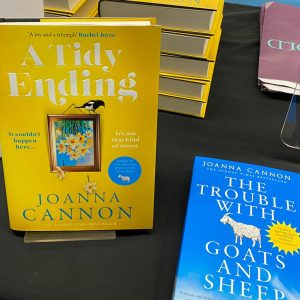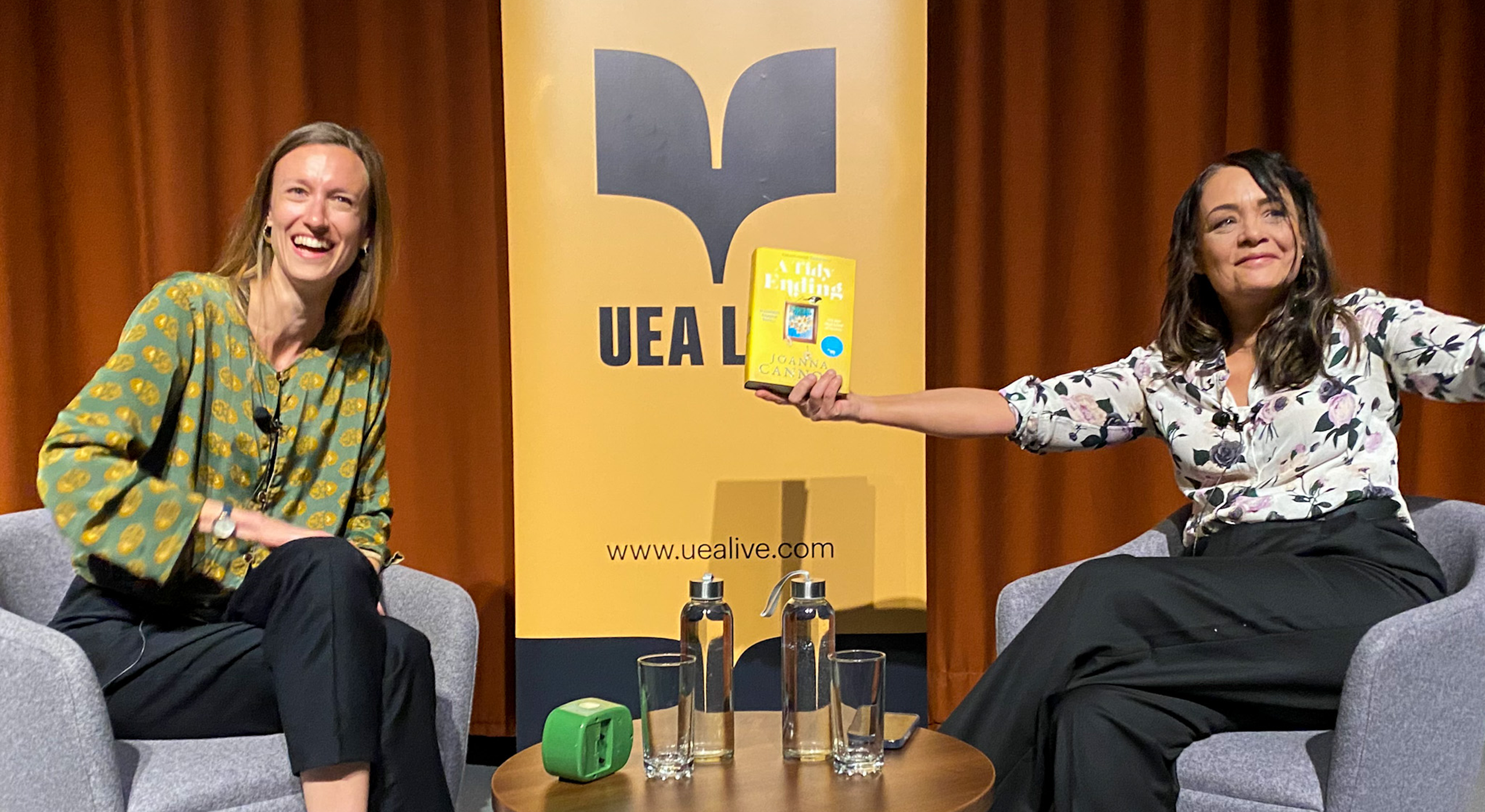Darkness and Humour: an Audience with Joanna Cannon
Written for UEA Live by Eleanor Carr
On the eve of the publication of her book A Tidy Ending, Joanna Cannon was at UEA Live discussing her new novel. Cannon is a two-time Sunday Times best-selling author, whose endearing characters and darkly hilarious plots captured readers’ hearts. She was in conversation with Holly Ainley, who runs the BBC Radio Norfolk book club and has worked as a book buyer for Jarrold in Norwich. I was lucky enough to attend and hear all about the novel first-hand.
Cannon started the evening by reading an extract from her newest novel. She chose the very beginning of the story to introduce the audience to her protagonist, Linda. Cannon stated that she was interested in people on the fringes of society and Linda was one of these people.
A Tidy Ending concerns Linda, a lonely woman with an emotionally distant husband. Her move to a new house brings her into the life of the woman that used to live there through the magazines that still arrive. Linda makes the decision to try and live like the women in the magazines and thus improve her life. But as Linda becomes more and more involved in keeping up appearances, women in the neighbourhood are going missing, and her husband is keeping increasingly stranger hours.
Her move to a new house brings her into the life of the woman that used to live there through the magazines that still arrive. Linda makes the decision to try and live like the women in the magazines and thus improve her life. But as Linda becomes more and more involved in keeping up appearances, women in the neighbourhood are going missing, and her husband is keeping increasingly stranger hours.
At the end of the reading, Cannon joked that her partner had read the same extract and said, “You’re talking about yourself.” She noted that both herself and Linda were more likely to watch others than to get involved, and therefore fade into the background. This leads Holly to ask, where exactly the character of Linda came from. Cannon said that while Linda was partially inspired by herself, she was an amalgamation of people she had met and that she first appeared in a short story. Cannon explained that she needed to write a story to be read aloud and was so inspired by the voice of the actress Melissa Berry that she wrote something especially for her. But even after this, she couldn’t stop thinking about Linda and felt certain that she had more to say.
Linda is a unique voice and one Cannon tailored perfectly to tell the story she is in. Cannon mentioned that in her previous book Three Things About Elsie, she had explored what it is like to grow old and realise that you haven’t got anyone who cares about you, and the voice for that book had to be an elderly woman. For this book, she felt that Linda was the perfect person to explore the tension between public perception and inner life, and the struggle of never being able to live up to what you think you should be. Ainley agreed and noted that Linda is very quotable, perfect for the new age of social media. Cannon agreed and noted that she was anxious about including social media in a book as it would date it very quickly but felt that the story couldn’t be told without it, as social media is the main place you can truly curate a fictional version of yourself.

Holly Ainley and Joanna Cannon at UEA Live
Ainley went on to ask about Cannon’s writing process to which she laughed and jokingly asked “What process?” She then explained that since she writes character-driven stories she doesn’t map out exactly what happens in the story, but always has to know how it will end. She then lets her characters take her from A to B in the way that fits them best. She related a story about a news article she had read about “the face of Christ appearing in a drainpipe” which she felt she had to include in her novel The Trouble with Goats and Sheep. She mentioned that if she plotted more neatly, she would have felt guilty adding parts that weren’t in the original plan. She did however note that you should have a clear idea of the tone of your book before you start writing. She quoted Julia Cohen as saying, “You should be able to sum up your book in one word” and decided that word for A Tidy Ending was envy. She mentioned that while it is darker than her previous books it is funny too and said that characters like real people all have “humour and darkness in them”.
This related very much to Cannon’s previous career as a psychiatrist with the NHS. She worked for many years in psychiatric intensive care wards and noted that the one thing everyone there had in common was that they never expected to be there. She wrote her first novel The Trouble with Goats and Sheep in NHS car parks, and her career directly impacted her writing. Her memoir Breaking and Mending, released in 2019, related her experiences in this field and she discussed the difference between writing fiction and reality. Cannon mentioned that while writing reality was therapeutic, it made you a lot more vulnerable than fiction, although compassion for your subject is key whether it is a character or yourself. At the end of the talk, Cannon talked about a new project she is involved in where twelves authors will work with twelve people who have struggled with their mental health to tell their stories. This is a true passion project for her and while the release date is not set, she teased it may be sooner than we think.
Across her career, as a doctor and as an author, Cannon always seems to bring a sense of compassion and desire to understand others. Answering an audience question Cannon said that she felt passionate that you should not put all your own opinions in a book but trust your characters to convey their own feelings. She also noted that she wanted every character to have their own story even if it is never explored, as even the smallest detail can become relevant later. This, she joked, is the power of the subconscious: it does the foreshadowing for you.
Despite the often dark subjects she covers, Cannon’s enthusiasm and humour always shine through. At one point she relayed a question that she had been asked by a fifteen-year-old girl several years ago. If you write to escape, what do you do when writing is what you need to escape from? To this Cannon said that she now writes for one purpose only: Joy.
Eleanor Carr is a third year English and Creative writing student at UEA. In her spare time she writes for the Concrete student newspaper and works for the student created zine Mausoleum Press. She enjoys exploring literature from across the world and reading and writing script for stage and screen.

